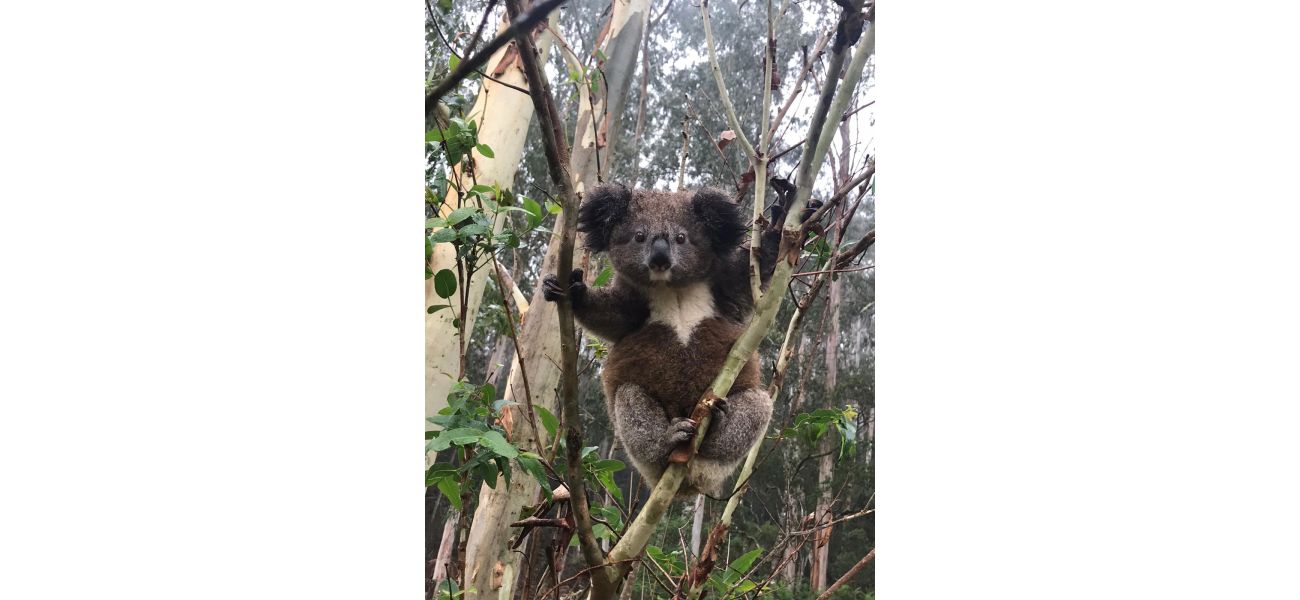A detection dog assists in finding a cluster of koalas that are free of chlamydia.
Koalas in Australia are commonly infected with STDs, which contributes to their dwindling numbers.
December 9th 2024.

On the NSW mid-north coast, a clever sniffer dog has made a remarkable discovery - a new type of koala sub-species that is free from chlamydia. As many people know, chlamydia is a sexually transmitted disease that has been plaguing large numbers of Australian marsupials and is a major factor in their population decline.
Finding a group of koalas that is completely free from this disease is a rare occurrence, but Max the English springer spaniel proved to be a lucky charm in Coffs Harbour. Trained to sniff out koala excrement, Max found a population of 10 koalas in the Fernbrook area and around the Dorrigo Plateau that appear to be genetically distinct from other koalas. And the best part? Tests on their droppings showed that they are also free from chlamydia.
Lynn Baker from Canines for Wildlife, who works closely with Max, expressed her excitement about this discovery. The koalas in Fernbrook have always caught the attention of researchers due to their different appearance - they are a lot furrier and darker in color compared to their coastal counterparts. Some even call them "cold weather koalas". But now, with the added knowledge that they are also genetically unique and chlamydia-free, it is crucial that we protect this special group of koalas.
Baker and her team are now on a mission to determine if there are more chlamydia-free koalas in the wild, possibly connected to the group in Fernbrook. This discovery also sheds light on the importance of preserving their habitat, particularly in state forests where logging poses a threat to their survival. A recent survey of koalas in the mid-north coast region showed that the overall population is healthy and has good genetic diversity, with low levels of chlamydia. However, these positive findings could quickly change if we do not take action to protect their habitat.
WWF-Australia is urging the NSW government to halt logging in the proposed national park and to plan for a sustainable transition towards timber plantations. As conservation scientist Dr Stuart Blanch points out, the koalas in this region are in danger if their habitat is not safeguarded. The results of these surveys serve as a reminder of the need to take immediate action to protect these unique Australian marsupials. To stay informed about the latest news, including updates on this discovery, download the 9News app and receive notifications straight to your phone.
Finding a group of koalas that is completely free from this disease is a rare occurrence, but Max the English springer spaniel proved to be a lucky charm in Coffs Harbour. Trained to sniff out koala excrement, Max found a population of 10 koalas in the Fernbrook area and around the Dorrigo Plateau that appear to be genetically distinct from other koalas. And the best part? Tests on their droppings showed that they are also free from chlamydia.
Lynn Baker from Canines for Wildlife, who works closely with Max, expressed her excitement about this discovery. The koalas in Fernbrook have always caught the attention of researchers due to their different appearance - they are a lot furrier and darker in color compared to their coastal counterparts. Some even call them "cold weather koalas". But now, with the added knowledge that they are also genetically unique and chlamydia-free, it is crucial that we protect this special group of koalas.
Baker and her team are now on a mission to determine if there are more chlamydia-free koalas in the wild, possibly connected to the group in Fernbrook. This discovery also sheds light on the importance of preserving their habitat, particularly in state forests where logging poses a threat to their survival. A recent survey of koalas in the mid-north coast region showed that the overall population is healthy and has good genetic diversity, with low levels of chlamydia. However, these positive findings could quickly change if we do not take action to protect their habitat.
WWF-Australia is urging the NSW government to halt logging in the proposed national park and to plan for a sustainable transition towards timber plantations. As conservation scientist Dr Stuart Blanch points out, the koalas in this region are in danger if their habitat is not safeguarded. The results of these surveys serve as a reminder of the need to take immediate action to protect these unique Australian marsupials. To stay informed about the latest news, including updates on this discovery, download the 9News app and receive notifications straight to your phone.
[This article has been trending online recently and has been generated with AI. Your feed is customized.]
[Generative AI is experimental.]
0
0
Submit Comment





